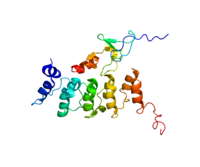
Photo from wikipedia
Targeted engineering of mammalian cells has been widely attempted to ensure the efficient production of therapeutic proteins with proper quality during bioprocesses. However, the identification of novel targets for cell… Click to show full abstract
Targeted engineering of mammalian cells has been widely attempted to ensure the efficient production of therapeutic proteins with proper quality during bioprocesses. However, the identification of novel targets for cell engineering is labor-intensive and has not yet been fully substantiated. Here, we established a CRISPR/Cas9 library screening platform in human embryonic kidney (HEK293) cells based on guide RNA integration mediated by recombinase-mediated cassette exchange (RMCE) to interrogate gene function in a high-throughput manner. This platform was further advanced using a nuclear localization signal-tagged recombinase that increased RMCE efficiency by 4.8-fold. Using this platform, we identified putative target genes, such as CDK8, GAS2L1, and GSPT1, and their perturbation confers resistance to hyperosmotic stress that inhibits cell growth and induces apoptosis. Knockout of these genes in monoclonal antibody (mAb)-producing recombinant HEK293 (rHEK293) cells enhanced resistance to hyperosmotic stress-induced apoptosis, resulting in enhanced mAb production. In particular, GSPT1-knockout yielded 2.3-fold increase in maximum mAb concentration in fed-batch culture where hyperosmotic stress naturally occurs due to nutrient feeding. Taken together, this streamlined screening platform allows the identification of novel targets associated with hyperosmotic stress, enabling the development of stress-resistant cells producing recombinant proteins.
Journal Title: Metabolic engineering
Year Published: 2022
Link to full text (if available)
Share on Social Media: Sign Up to like & get
recommendations!